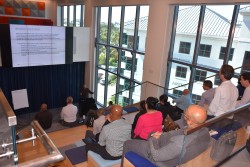News
Joint Ministry Training in Fraud Prevention and Detection offered to Civil Servants

The Ministry of Employment and Border Control and The Ministry of Commerce, Planning and Infrastructure worked together to organise fraud prevention and detection training sessions for over 100 employees in the civil service.
The training sessions facilitated by local consulting firm KPMG, were designed to increase the capabilities within the Ministries to detect, prevent and manage potential situations of fraud and corruption and to provide a better understanding of the systems of internal controls that should be in place to address those situations.
Participants at the training sessions, which started from 20th November and runs through to 12th December, included managers, heads of departments and staff involved in the areas of accounting, procurement and asset management.
The first training session for managers and department heads, focused primarily on understanding risk and assessing an organisation exposure to risk. Some of the topics covered during that session included cyber fraud, bribery and corruption, fraud prevention, data protection, digital forensics, contract and procurement fraud, among other areas.
The second session was geared at persons who have been in the Ministries for over five years and had completed the training previously. This refresher training covered topics such as data protection, cyber fraud and data analytics.
Chief Financial Officer in the Ministry of Commerce, Planning and Infrastructure, Mr. Carrol Cooper stated that the having these sessions “underscores the Ministry’s commitment to training staff to improve the way we detect, prevent and fight fraud.” He further noted that the training was important as it bought together employees from different areas to come to a better understanding on how to best prevent fraud.
Justin Hislop from the Ministry of Employment & Border Control states “It was great to hear from leading professionals in each of their respective fields, from cyber security to digital auditing, the training offered an in-depth analysis into new and emerging trends in global finance. I was particularly interested to see how data security laws are being implemented and interpreted by both governments and private entities, and exactly what ripple effects those decisions are having on the Cayman Islands as we move into the future of financing”.
Chief Financial Officer in the Ministry of Employment & Border Control said “Professional development is important within the civil service and our ministry is focused on equipping our staff with the necessary knowledge in all areas needed to prevent, detect and manage fraudulent situations”.
The final four days of training continues this week and is offered to civil servants every five years.












